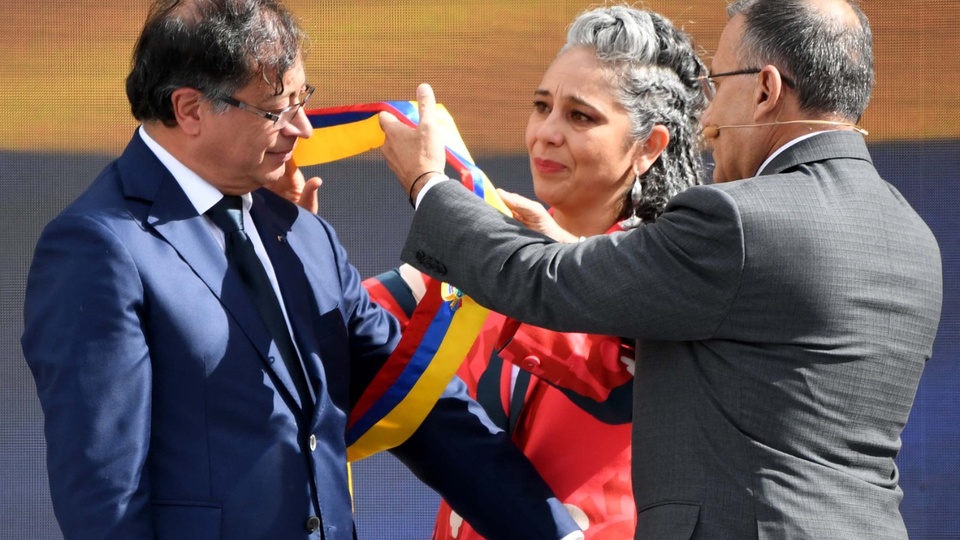
Gustavo Pedro was sworn in as president of Colombia this Sunday, before hundreds of thousands of people attended an investiture ceremony in Bogotá. It’s a historic day since the former senator became the first leftist Colombian president.
“I swear to God, I promise the people to faithfully comply with the constitution and laws of Colombia,” Pedro, 62, said before the Congress president in the central Plaza de Bolivar.
Senator María José Pizarro, daughter of Carlos Pizarro, who was the president’s comrade in the M-19 guerrillas and was assassinated by state terrorism in 1990, put the presidential hunt on Pedro when he was a candidate for the presidency.
Minutes later, the new president administered the oath of office to his running mate, Francia Marquez, who holds the office of vice president. At that precise moment, Pedro’s first presidential decree was passed, loaded with symbolism: the new president ordered the sword of the libertarian Simón Bolívar to be brought to the Military Palace. The government, at the apparent decision of Petro’s predecessor, Ivan Duke, refused to recognize his departure.
Summit between Alberto Fernandez and Gustavo Pedro
This Sunday, Hours before the inauguration, Pedro welcomed President Alberto Fernandez In the private mansion of the Palace of San Carlos, where the liberator Simon Bolivar lived. With all the actors involved in the armed conflict, Fernández offered Argentina’s permanent support for the great challenge of the new president achieving complete peace.
Fernández praised Pedro’s decision to resume dialogue with the National Liberation Army (ELN) and expressed Argentina’s willingness to go along with the process of ending violence after six decades of war. “We have carefully followed the proposals and guidelines to achieve complete peace during the election campaign and after the victory. “We are determined to continue and strengthen Argentina’s commitment and support for peace in Colombia,” the President said.
Fernández and Pedro agreed that Latin America should integrate to strengthen organizations such as CELAC, as well as bring Colombia closer to Mercosur. The two discussed the implications of the war in Ukraine and the pandemic in the crisis in the region.
For decades, Colombia has been ruled by a right wing that maintains a foreign policy strongly aligned with the United States. For years, the North funded Project Colombia to fight drug trafficking and insurgency. After the peace accords in Havana, Washington supported Bogotá under the name Pas Colombia.
Fernández was optimistic about this new environment opening up with Pedro’s investment. “We need an active Colombia on the path of Latin American integration.” Part of that is certainly reestablishing ties between Colombia and Venezuela after years of estrangement between the two countries, which share a 2,200-kilometer border.
Presumption: domestic ritual and popular support
With songs in the ancestral languages of the “elders” (leaders) and a great realm of elements of nature, The Vice President and President were elected by the alliance last Saturday A historic deal They were invested spiritually before formal initiation.
“I want to thank you for being here at this ceremony. Here it begins Government of Peace, Environmental Justice, Social Justice. “The real power is in the movement of the people,” Pedro told Social Movements.
First reforms
Among the first measures to be debated in Congress are a ban on fracking, an anti-hunger ordinance and tax reform. A new “more progressive and fair” tax plan, Pedro repeatedly said during the campaign. As a result, the largest tax burden will fall on the 4,000 richest in Colombia. It seeks to raise about 50 billion pesos (about $11.5 billion) a year.
with ambition Tax reform The incoming government wants to increase the country’s resources, which in 2023 will have a budget of 391.4 billion pesos (about 91.19 billion dollars today), according to the plan.
In a country of 50 million people, plagued by inflation (10.2% year-on-year), unemployment (11.7%) and poverty (39%), the elected government is proposing a series of reforms to narrow the gap between rich and poor. One of the most unequal countries in the region.
These efforts create anticipation among those gathered at Parque Tercer Milenio. Like George Lara, a 52-year-old Afro-descendant, university professor. “The economic and social gap is very high. We believe that Petro can reduce it. 40 percent of people live in poverty. It is very high.”
According to the Department of National Statistics (DANE), 19.6 million people were living in poverty in the country last year.

“Introvert. Thinker. Problem solver. Evil beer specialist. Prone to fits of apathy. Social media expert. Award-winning food fanatic.”





More Stories
Two influencers drown after refusing to wear life jackets: “ruining selfies”
Uruguay 2024 election results: who won and when is the second round | Waiting to know whether there will be a runoff or not
Uruguay: Lacalle Pou leaves with his figure on the slopes | The Marcet and Asteziano scandals hit the right-wing ruler